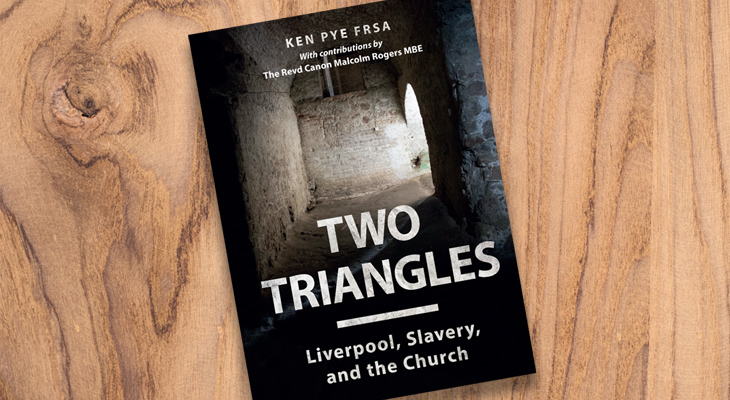
Two Triangles has been commissioned by the Diocese of Liverpool as part of their reconciliation programme – Triangle of Hope. This has seen us partnering with the Dioceses of Virginia and Kumasi to explore the painful legacy of the slave trade; to educate present generations around the danger posed by modern slavery and to offer reconciliation for past ills.
Two Triangles takes us on this journey showing how the church endorsed and profited from the evil commoditisation of human beings alongside a city that was built on the back of the slave trade. Showing how the triangle of trade between Liverpool, America and Africa operated and how the unimaginable suffering of the African people was justified theologically. But it builds to a story of hope as it shows how the modern church is committed to turning this triangle of despair into one of hope.
Canon Mal Rogers MBE who as Canon for Reconciliation leads the diocesan work on the Triangle of Hope described a photo of a grille Christians would walk over on their way to Holy Communion. That was mirrored by a photo of the dungeon the grille covered, a dungeon under the church where hundreds of men would live together in horrific conditions – chained, crammed, starving and covered in urine and excrement. Malcolm said of the book “It is a harrowing, honouring of the millions stolen from their homeland to be tortured and dehumanised. It is a call to action to inspire others to be involved in the fight to end modern slavery.”
The Triangle of Hope is a community involving the Diocese of Kumasi in Ghana, the Diocese of Liverpool in the UK and the Diocese of Virginia in the USA. Members are dedicated to transforming the long history, ongoing effects, and continuing presence of slavery in our world through repentance, reconciliation, and mission.
On June 2017, the Statement by Bishops of Kumasi, Virginia and Liverpool, June 2017 stated “Each one of our Dioceses was directly involved in the dreadful Slave Triangle. We remember and acknowledge with sorrow that human beings were captured and enslaved for financial gain with no regard for their dignity and humanity. We view this history with great pain and in penitence before God, the God who wills in Christ to bring freedom and justice for all.
We stand together, determined that the horror of slavery, and its memories of inhumanity, oppression and anguish, must not and will not be forgotten. We commit ourselves to learn from these memories and to ensure that the lessons are shared and embedded in our lives and in our Dioceses. We also stand together in opposing all forms of slavery today, and we are wholeheartedly committed to doing all we can to help those caught in its chains, and to advocate for justice and freedom and for an end to all modern slavery and human trafficking.